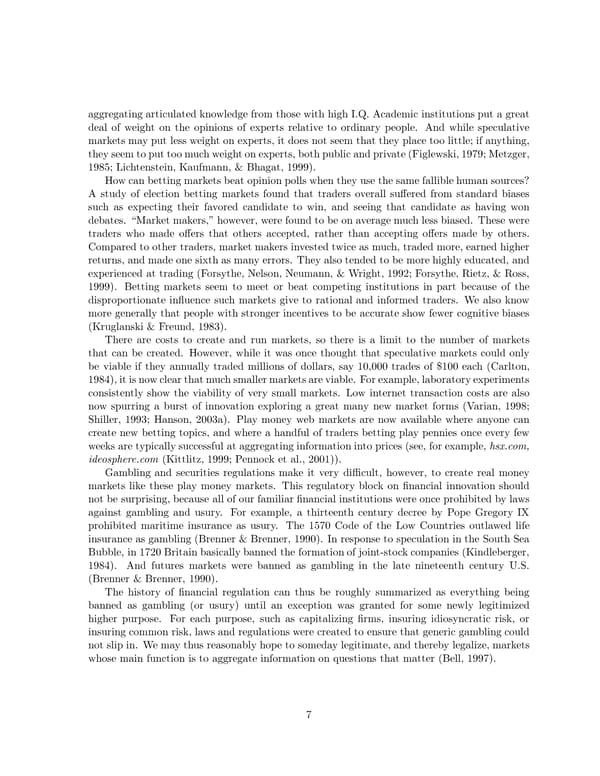aggregating articulated knowledge from those with high I.Q. Academic institutions put a great deal of weight on the opinions of experts relative to ordinary people. And while speculative markets may put less weight on experts, it does not seem that they place too little; if anything, they seem to put too much weighton experts, both public and private(Figlewski,1979; Metzger, 1985; Lichtenstein, Kaufmann, & Bhagat, 1999). Howcanbettingmarketsbeatopinionpolls when they use the same falliblehuman sources? A study of election betting markets found that traders overall suffered from standard biases such as expecting their favored candidate to win, and seeing that candidate as having won debates. “Market makers,” however, were found to be on average much less biased. These were traders who made offers that others accepted, rather than accepting offers made by others. Comparedto other traders, market makers invested twice as much, traded more, earned higher returns, and made one sixth as many errors. They also tended to be more highly educated, and experienced at trading (Forsythe, Nelson, Neumann, & Wright, 1992; Forsythe, Rietz, & Ross, 1999). Betting markets seem to meet or beat competing institutions in part because of the disproportionate influence such markets give to rational and informed traders. We also know more generally that people with stronger incentives to be accurate show fewer cognitive biases (Kruglanski & Freund, 1983). There are costs to create and run markets, so there is a limit to the number of markets that can be created. However, while it was once thought that speculative markets could only be viable if they annually traded millions of dollars, say 10,000 trades of $100 each (Carlton, 1984),it is nowclear thatmuch smallermarketsareviable. Forexample,laboratoryexperiments consistently show the viability of very small markets. Low internet transaction costs are also now spurring a burst of innovation exploring a great many new market forms (Varian, 1998; Shiller, 1993; Hanson, 2003a). Play money web markets are now available where anyone can create new betting topics, and where a handful of traders betting play pennies once every few weeks are typically successful at aggregating information into prices (see, for example, hsx.com, ideosphere.com (Kittlitz, 1999; Pennock et al., 2001)). Gambling and securities regulations make it very difficult, however, to create real money markets like these play money markets. This regulatory block on financial innovation should not be surprising, because all of our familiar financial institutions were once prohibited by laws against gambling and usury. For example, a thirteenth century decree by Pope Gregory IX prohibited maritime insurance as usury. The 1570 Code of the Low Countries outlawed life insurance as gambling (Brenner & Brenner, 1990). In response to speculation in the South Sea Bubble, in 1720 Britain basically banned the formation of joint-stock companies (Kindleberger, 1984). And futures markets were banned as gambling in the late nineteenth century U.S. (Brenner & Brenner, 1990). The history of financial regulation can thus be roughly summarized as everything being banned as gambling (or usury) until an exception was granted for some newly legitimized higher purpose. For each purpose, such as capitalizing firms, insuring idiosyncratic risk, or insuring common risk, laws and regulations were created to ensure that generic gambling could not slip in. We may thus reasonably hope to someday legitimate, and thereby legalize, markets whose main function is to aggregate information on questions that matter (Bell, 1997). 7
 Shall We Vote on Values, But Bet on Beliefs? Page 8 Page 10
Shall We Vote on Values, But Bet on Beliefs? Page 8 Page 10